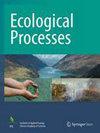湖泊微生物群组成决定了群落对气候变暖扰动的适应性
IF 3.9
2区 环境科学与生态学
Q1 ECOLOGY
引用次数: 0
摘要
微生物群落对生态系统至关重要。微生物生态学研究的一个核心目标是简化自然环境中的生物多样性并量化其功能作用,以探索生态系统在不同环境条件下的反应。然而,有关湖泊微生物在反复变暖压力下的稳定性和动态响应的研究十分有限。为排除环境因素的干扰,我们进行了为期20天的反复升温模拟实验,以考察湖泊微生物群落的组成和功能动态。实验升温明显改变了细菌而非真菌的群落结构。微生物群落结构与微生物生物量共同调节着微生物群落的功能。高温后,好氧反硝化菌假单胞菌科的数量骤减了99%(P < 0.001),导致微生物氮呼吸和硝酸盐呼吸的氮代谢减少。在气候变暖条件下,适应能力较强的微生物群落在共生网络中表现出更多的正相关关系和更少的竞争关系,以适应气候变暖。微生物组的组成控制着碳氮代谢,从而决定了湖泊微生物群落对热应力的适应性。这项研究扩展了我们对气候变暖驱动下湖泊微生物群落响应和适应性的认识。本文章由计算机程序翻译,如有差异,请以英文原文为准。
Lake microbiome composition determines community adaptability to warming perturbations
Microbial communities are crucial for ecosystems. A central goal of microbial ecological research is to simplify the biodiversity in natural environments and quantify the functional roles to explore how the ecosystems respond under different environmental conditions. However, the research on the stability and dynamics of lake microbes in response to repeated warming stress is limited. To exclude confounding environmental factors, we conducted a 20-day repeated warming simulation experiment to examine the composition and function dynamics of lake microbial communities. Experimental warming significantly altered the community structure of bacteria instead of fungi. Microbial community structure, together with microbial biomass, jointly regulated the function of microbial communities. The plummeting of aerobic denitrifiers Pseudomonadaceae decreased by 99% (P < 0.001) after high temperature, leading to reduced microbial nitrogen metabolism on nitrogen respiration and nitrate respiration. Under warming conditions, the microbial community with higher adaptability showed more positive correlations and less competitive relationships in co-occurrence networks to acclimate to warming. Microbiome composition controlled carbon and nitrogen metabolism, thus determining lake microbial communities’ adaptability to heat stress. This study extended our insights on the lake microbial community response and adaptability under warming drivers.
求助全文
通过发布文献求助,成功后即可免费获取论文全文。
去求助
来源期刊

Ecological Processes
Environmental Science-Ecological Modeling
CiteScore
8.50
自引率
4.20%
发文量
64
审稿时长
13 weeks
期刊介绍:
Ecological Processes is an international, peer-reviewed, open access journal devoted to quality publications in ecological studies with a focus on the underlying processes responsible for the dynamics and functions of ecological systems at multiple spatial and temporal scales. The journal welcomes manuscripts on techniques, approaches, concepts, models, reviews, syntheses, short communications and applied research for advancing our knowledge and capability toward sustainability of ecosystems and the environment. Integrations of ecological and socio-economic processes are strongly encouraged.
 求助内容:
求助内容: 应助结果提醒方式:
应助结果提醒方式:


